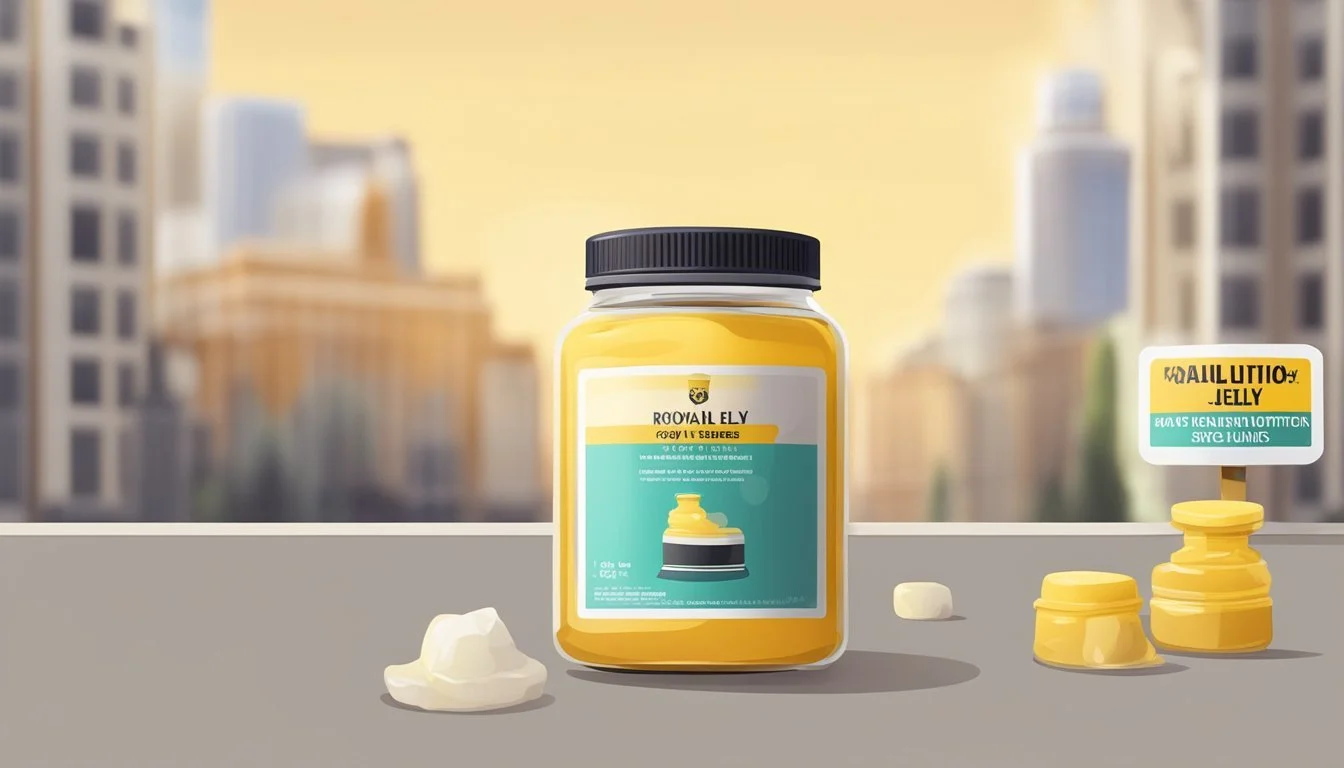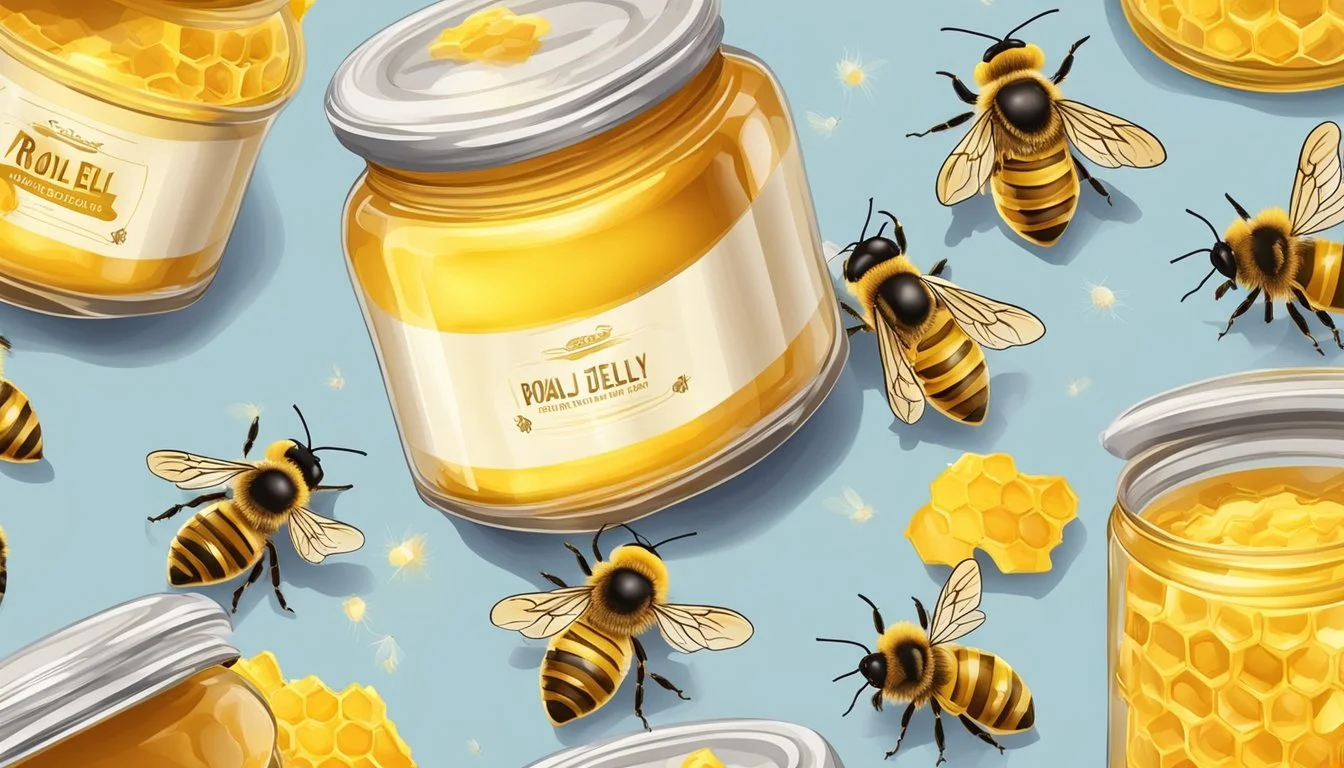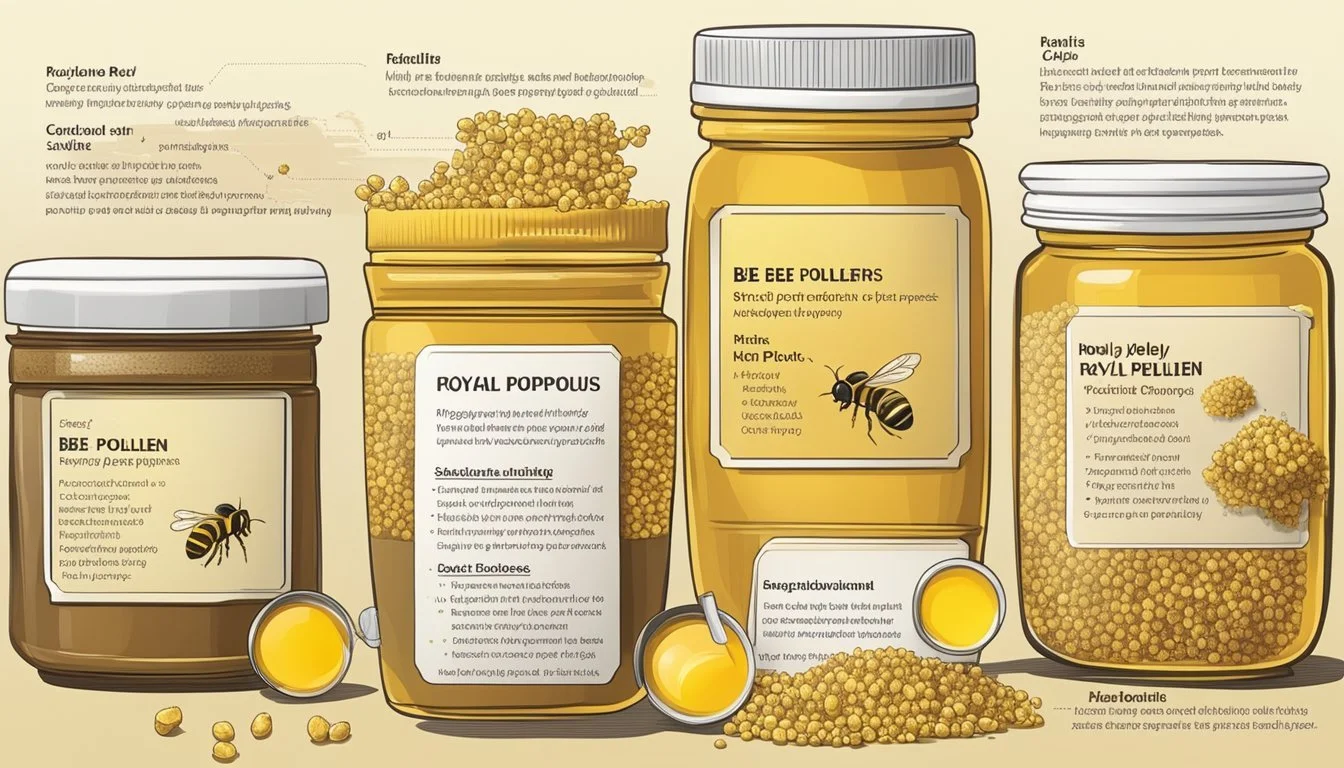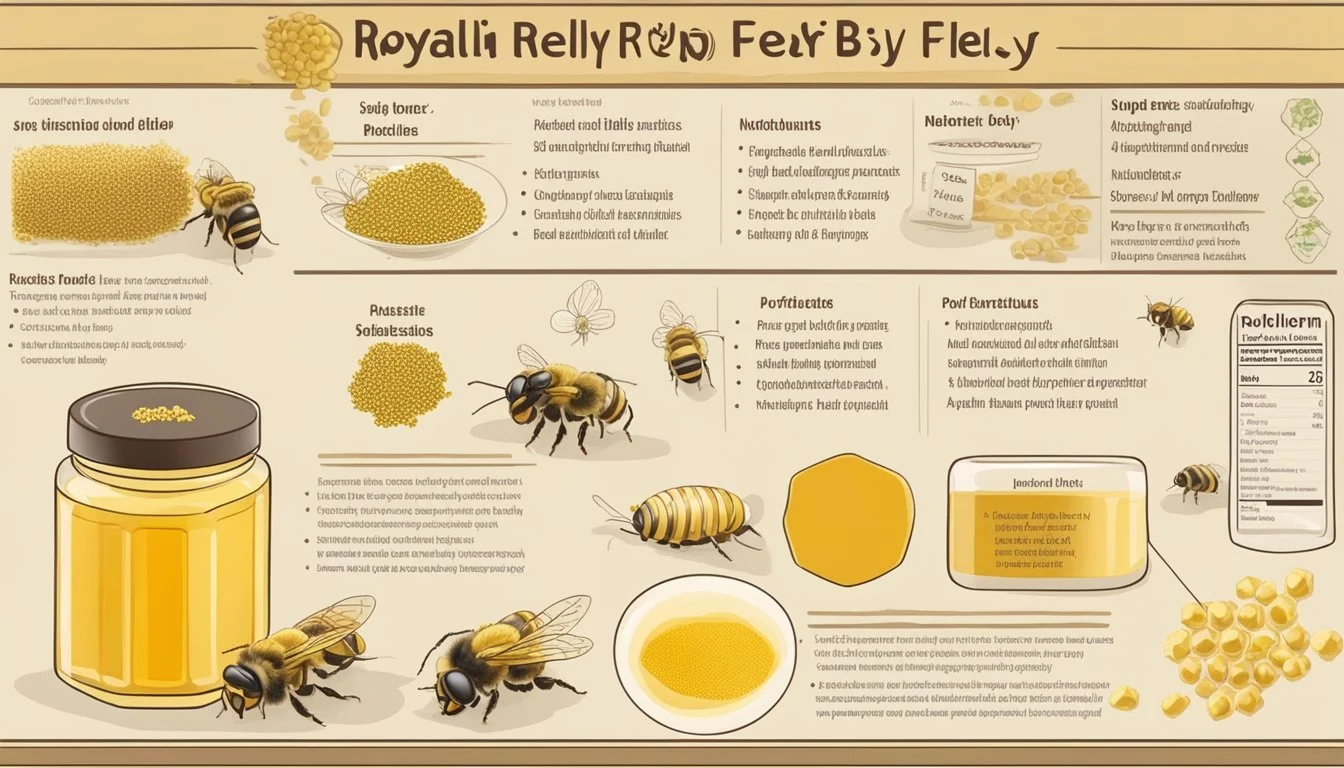Royal Jelly Substitutes
Alternative Solutions for Vital Nutrition
For those seeking the health benefits of royal jelly but unable to obtain it, there are several substitutes that can provide similar effects. Bee pollen stands out as one of the most remarkable alternatives, offering a rich mix of vitamins, minerals, and proteins that contribute to overall wellness. Additionally, bee pollen is known for promoting energy and immune support, making it a valuable addition to any diet.
Another viable substitute is propolis, a resin-like material produced by bees. Like royal jelly, propolis boasts antibacterial, antiviral, and anti-inflammatory properties, making it beneficial for boosting the immune system and maintaining oral health.
Ginseng is also an excellent option for those looking to enhance their energy levels and mental clarity. This well-known adaptogen provides numerous health benefits, including stress relief and increased stamina, which align closely with the advantages offered by royal jelly.
Understanding Royal Jelly
Royal jelly is a nutrient-rich secretion produced by honey bees for the development of queen bees. It is composed of various proteins, fats, carbohydrates, vitamins, and minerals, which contribute to its health benefits.
Defining Royal Jelly
Royal jelly is a creamy, white substance secreted by nurse bees. It is used to nurture all larvae in a hive for the first few days of life. After this initial period, it becomes the exclusive diet of larvae chosen to become queen bees. Produced in the glands of worker bees, royal jelly supports the queen's development and longevity.
Role in Bee Colonies
In bee colonies, royal jelly plays a crucial role. Worker bees consume it only briefly, whereas future queens consume it throughout their development. This exclusive diet enables the queen bee to grow larger and have a significantly longer lifespan compared to worker bees. The queen's diet of royal jelly also boosts her fertility, allowing her to lay thousands of eggs.
Nutritional Profile
Royal jelly is packed with essential nutrients, making it a potent health supplement. Its primary components are proteins, which make up around 12-15% of its composition. Other key elements include fats (3-6%) and carbohydrates (10-12%), along with a rich array of B vitamins such as B1, B2, B6, and B12. It also contains minerals like calcium, magnesium, potassium, and iron, contributing to its high nutritional value. In addition, royal jelly exhibits antibacterial and antioxidant properties, which help in promoting overall wellness.
Health Benefits of Royal Jelly
Royal jelly has been linked to numerous health benefits due to its rich nutrient profile, including potential cardiovascular support, relief from menopause symptoms, improvements in skin health, and anti-inflammatory properties.
Cardiovascular Support
Royal jelly may help reduce the risk of heart disease. It contains antioxidants and vitamins that can benefit heart health. Some studies indicate that consuming royal jelly can lower cholesterol levels, which is crucial for maintaining a healthy cardiovascular system.
In addition, royal jelly's potential ability to improve lipid profiles can further support heart health. The fatty acids and unique proteins found in royal jelly may help prevent plaque buildup in arteries, reducing heart disease risk.
Menopause Symptom Relief
Royal jelly may offer relief for menopause symptoms. It can help balance hormones and alleviate common issues like hot flashes and night sweats. This natural supplement can be a supportive alternative for those seeking to manage menopause symptoms without hormone replacement therapy.
Research has shown that royal jelly may also improve overall mental health during menopause. It may reduce mood swings, anxiety, and depression associated with hormonal changes. As a result, it can improve quality of life for those experiencing menopause.
Skin Health Improvement
Royal jelly is beneficial for various skin conditions due to its high nutrient content. It promotes collagen production, which is essential for maintaining skin elasticity and youthfulness. This makes it a valuable ingredient in many skincare products.
The antioxidants in royal jelly protect the skin from free radicals, potentially reducing signs of aging. Additionally, its antibacterial properties can help heal wounds faster and reduce the incidence of acne and other skin conditions.
Anti-inflammatory Properties
Royal jelly has strong anti-inflammatory properties. It can help reduce inflammation in the body, which is linked to numerous chronic conditions. The unique proteins and fatty acids in royal jelly play a significant role in its anti-inflammatory effects.
For individuals dealing with arthritis or other inflammatory diseases, royal jelly may provide some relief. By reducing inflammation, it supports overall health and well-being. This makes it a valuable supplement for those seeking natural anti-inflammatory options.
Potential Risks and Side Effects
Potential risks include allergic reactions and interaction with medications. It's important to know the details to prevent complications.
Allergic Reactions
Royal jelly can cause allergic reactions, particularly in individuals with asthma or bee product allergies. Common symptoms include hives, contact dermatitis, and more severe reactions like anaphylaxis. Anaphylaxis manifests as difficulty breathing and requires immediate medical attention. Allergic individuals should avoid royal jelly and seek advice from a healthcare provider before use. Low dosages initially, monitored by a professional, may mitigate risks. Certain reactions can worsen, leading to serious health issues if untreated.
Interactions with Medications
Royal jelly can interact with various medications. It's noted to increase estrogen and DHEA-S hormone levels, which may complicate hormone therapies. Notably, it can amplify the effects of blood thinners like Coumadin (warfarin), elevating bleeding risks. Individuals on these medications should consult a healthcare provider before taking royal jelly. Monitoring dosage and regular check-ups are essential to prevent adverse interactions. Careful, documented discussions with a physician can aid in safely managing potential risks.
Royal Jelly Substitutes
When looking for substitutes for royal jelly, options range from other bee products to plant-based alternatives and synthetic supplements. Each alternative has unique properties suited for various health and dietary needs.
Honey and Bee Products
Honey is a natural sweetener rich in antioxidants and enzymes. Though it lacks the high protein and fat content found in royal jelly, honey still offers numerous health benefits, including immune support and wound healing.
Other bee products like bee pollen and propolis also serve as supplements with their own set of nutrients. Bee pollen is rich in vitamins and amino acids, while propolis has anti-inflammatory and antimicrobial properties.
Product Key Nutrients Common Uses Honey Antioxidants, Enzymes Sweetener, Immune Support Bee Pollen Vitamins, Amino Acids Dietary Supplement, Energy Boost Propolis Flavonoids, Phenolics Antimicrobial, Anti-inflammatory
Plant-Based Alternatives
For those avoiding animal products, spirulina and chlorella are excellent substitutes. Spirulina is a blue-green algae packed with protein, vitamins, and minerals. It helps boost energy levels and supports detoxification.
Chlorella, another algae, is known for its ability to bind to heavy metals, aiding in detoxification. It also provides chlorophyll, which supports overall health and reduces inflammation.
Other options include maca root powder and ginseng. Maca root is an adaptogen that helps balance hormones and increase stamina. Ginseng, another adaptogen, is used in traditional medicine to enhance mental clarity and resilience to stress.
Synthetic Supplements
Synthetic supplements offer a convenient and vegan-friendly alternative to royal jelly. These supplements can mimic the nutrient profile of royal jelly, providing essential vitamins, minerals, and amino acids.
Common synthetic options include multivitamins designed specifically to replicate the nutrient benefits of natural sources. These often contain a mix of B vitamins, vitamin C, and trace minerals.
Examples:
Synthetic Protein Powders: Provide essential amino acids found in royal jelly.
Vitamin B Complex: Covers the B vitamins typically obtained from bee products.
Mineral Supplements: Ensure intake of trace elements like zinc and selenium.
Synthetic supplements can be an excellent choice for those with allergies or specific dietary restrictions.
Culinary Uses of Substitutes
Substitutes for royal jelly have a wide variety of culinary applications. They can enhance the sweetness in baked goods, create flavorful jams and jellies, and add depth to sauces and glazes.
Sweetening Baked Goods
Substitutes for royal jelly like grape jelly, apple jelly, or strawberry jam can be used to sweeten baked goods such as cookies, cakes, and pastries. These alternatives provide natural sweetness and flavor without the need for additional refined sugars. A spoonful of apple jelly in a muffin mix can infuse a delicate fruity undertone. Similarly, a layer of blackberry jam can transform a plain sponge cake into a delightful treat.
For health-conscious bakers, honey serves as a wonderful substitute, adding not only sweetness but also a moist texture to items like banana bread or oatmeal cookies. Using these substitutes can also add nutritional benefits, such as vitamins and antioxidants, to the final baked products.
Creating Jams and Jellies
Making homemade jams and jellies using substitutes involves fruits such as strawberries, raspberries, and blackberries combined with pectin and lemon juice. These ingredients can replicate the texture and consistency of traditional recipes. By incorporating cranberry jelly or red currant jelly, homemade spreads can achieve a balance of sweetness and tartness.
Blackcurrant jelly or jam and currant jelly alternatives offer similar uses, providing a robust flavor for breakfasts or snacks. Additionally, monk fruit or agave nectar can be blended with fruit to create sugar-free alternatives. Such substitutes not only match the taste but also cater to those with dietary restrictions.
Enhancing Sauces and Glazes
Incorporating these substitutes into sauces and glazes can bring rich flavors to various dishes. Cranberry sauce pairs well with meats like turkey and lamb, offering a sweet-tart contrast. Red currant jelly can be melted down and mixed with vinegar and herbs to create a delicious glaze for roasts.
Using grape jelly or apple jelly in savory dishes like glazed ham can result in a glossy finish and a hint of sweetness. Strawberry jam can also be used in barbecue sauces to add a fruity twist. These substitutes help to achieve a flavorful coating that can elevate simple recipes into gourmet experiences.
Considerations for Specific Diets
Different dietary needs require royal jelly substitutes that can offer similar benefits without conflicting with dietary restrictions. Substitutes should be chosen based on their nutritional content, whether for protein, sugars, or other essential nutrients.
Vegetarian and Vegan Alternatives
For those following vegetarian or vegan diets, royal jelly substitutes must align with their lifestyle choices. Soy protein is a prevalent alternative, offering a high protein content, which is beneficial for muscle repair and growth. Moreover, chia seeds are rich in omega-3 fatty acids, protein, and fiber, making them a valuable option.
Agave nectar and maple syrup can mimic the sweetness of royal jelly. They are suitable for regulating blood sugar levels and are easily incorporated into various recipes. Spirulina, another potent supplement, offers a range of vitamins and minerals, including protein and essential amino acids, ideal for everyday dietary needs.
For those needing gelatin substitutes, agar-agar, derived from algae, serves as a plant-based replacement. It provides a similar texture without any animal product involvement. For individuals with diabetes or blood sugar concerns, stevia serves as a natural sweetener alternative, providing sweetness without affecting blood sugar levels.
These substitutes ensure that dietary requirements are met while maintaining essential nutrients and avoiding animal-derived products.
Nutritional Comparisons
When evaluating substitutes for royal jelly, it's crucial to compare their nutritional profiles. Key areas of focus include protein content, vitamins and minerals, and fats and fatty acids to understand how different substitutes measure up.
Protein and Amino Acids
Royal jelly is known for its high protein content, which is essential for muscle repair and growth. It contains unique proteins like royalactin and a range of amino acids. Comparable substitutes include bee pollen and spirulina. Bee pollen boasts about 20-35% protein, with all essential amino acids present. Spirulina, a type of blue-green algae, contains around 60-70% protein, making it an excellent source of plant-based proteins. These options provide considerable protein, though their amino acid profiles differ slightly from royal jelly.
Vitamins and Minerals
Royal jelly is rich in vitamins B1, B2, B6, B5, and B7, as well as minerals like calcium, potassium, magnesium, zinc, and iron. Bee pollen also contains a broad spectrum of vitamins, including B-complex, C, D, and E, and minerals like calcium, magnesium, and iron. Chlorella, a single-celled green algae, is packed with vitamins A, B1, B2, B6, B12, C, and E, alongside minerals such as iron and magnesium. These substitutes offer a similar range of vitamins and minerals but in varying concentrations.
Fats and Fatty Acids
Royal jelly contains small amounts of fats, including beneficial fatty acids like 10-Hydroxy-2-decenoic acid (10-HDA). This specific fatty acid is unique to royal jelly. Alternatives like flaxseed oil and fish oil provide essential fatty acids, including omega-3 and omega-6, which support heart health and reduce inflammation. While these substitutes do not contain 10-HDA, they offer significant health benefits through their fatty acid profiles. Hemp seeds are another notable source, containing omega-3, omega-6, and omega-9 fatty acids in a balanced ratio. These sources ensure adequate intake of essential fats for those seeking alternatives to royal jelly.
Practical Tips for Substitution
When substituting royal jelly in recipes or dietary plans, it is essential to measure accurately and ensure proper storage to maintain the efficacy and quality of the substitutes.
Measuring and Dosage
Accurate measurement is crucial to achieve the desired effect when using royal jelly substitutes. Gelatin and pectin are common alternatives, often used in similar quantities.
For example:
Gelatin: Use a 1:1 ratio when substituting for royal jelly in recipes.
Pectin: Requires careful measurement as it may have a different gelling strength.
Fiber supplements may be another choice, particularly in dietary applications. Pay attention to serving sizes, as replacing royal jelly should match the intended calories and nutritional benefits.
Storage and Preservation
Proper storage ensures that substitutes like gelatin and pectin maintain their effectiveness.
Gelatin: Store in a cool, dry place, and keep it sealed to prevent moisture exposure.
Pectin: Also needs to be kept in an airtight container in a dry, cool environment.
For perishable substitutes, refrigeration or freezing might be necessary to preserve their quality. Always follow storage instructions to prevent spoilage and ensure maximum potency in the substitutes being used.









